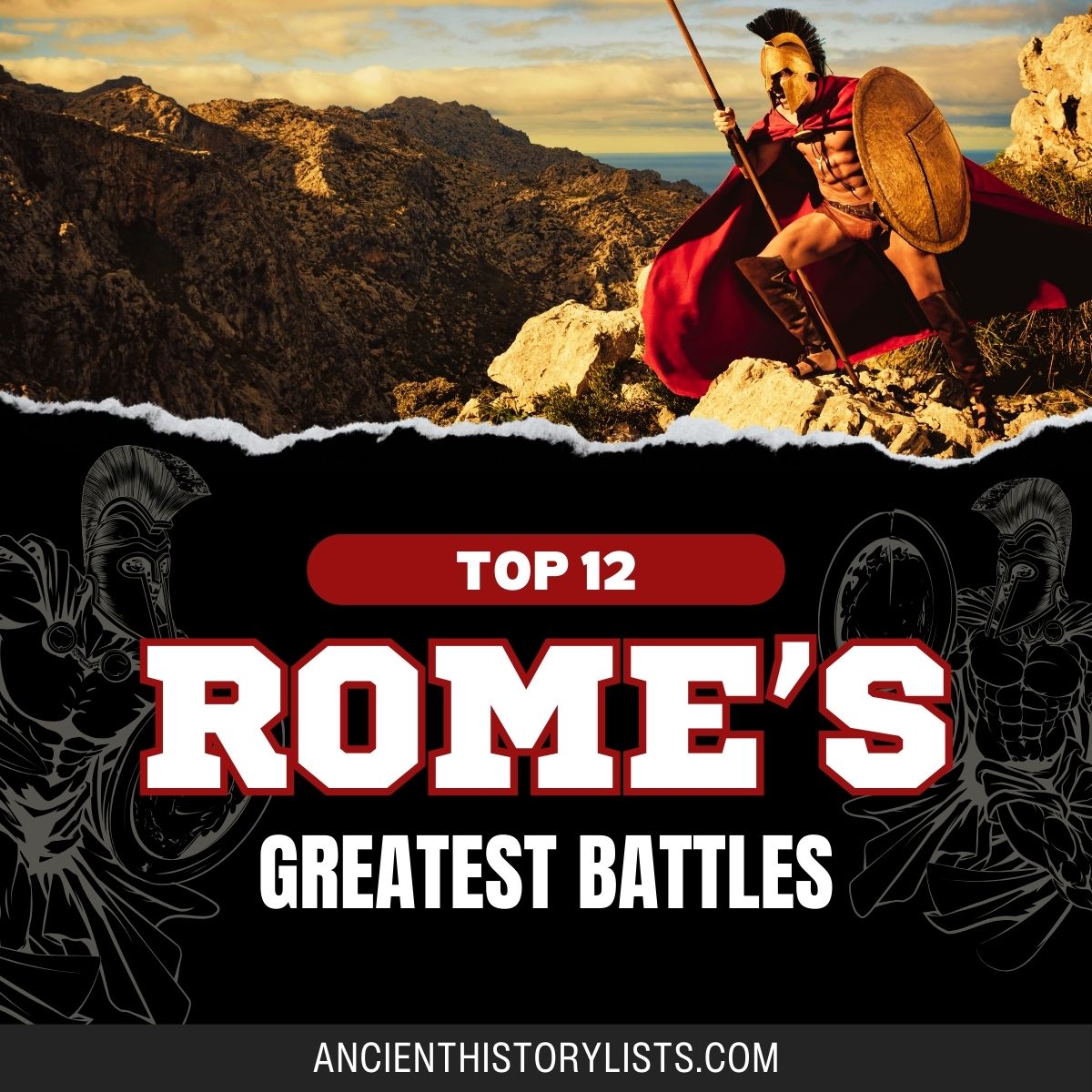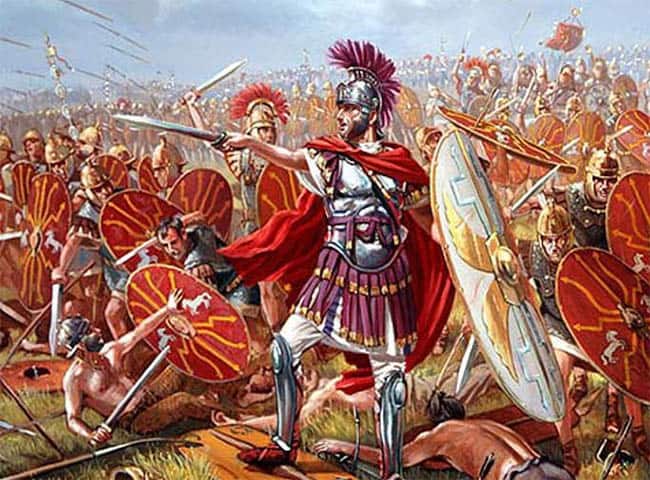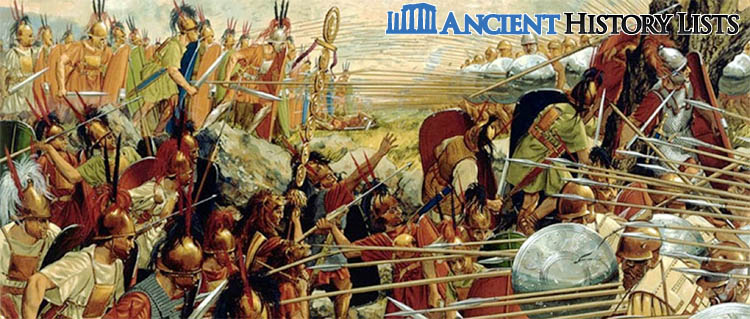Nothing could be truer than the famous saying, “Rome was not built in a day.” While Rome is well known for its lavish and indulgent way of life, many wars were fought along the way to ensure the survival of the republic and the empire.
Wars often led to changes in leadership which in turn allowed for the development of Roman culture and history throughout the Roman territories.

Here is a list of 12 famous wars that were fought in or on behalf of Rome:
1. Caesar’s Civil War

This war is also known as the Great Roman Civil War and was fought from 49 BC to 45 BC between Julius Caesar and members of the Roman Senate. Caesar had already become a superhero in the eyes of the Roman people after the Gallic War, and he introduced many reforms for the people of Rome.
Before Caesar’s Civil War, a series of wars had already been fought in Italy, Greece, Africa, and other parts of Europe as various leaders battled for political supremacy. The dictatorship of Lucius Cornelius Sulla soon meant that this politico–military situation eventually arrived on the doorstep of Rome itself.
As a result of the civil war, the Roman Empire was established. Mark Antony and Julius Caesar became rulers over the whole empire. Julius Caesar was later assassinated, and Mark Antony committed suicide after the death of Cleopatra.
2. Roman–Latin War
The Roman–Latin War started in the seventh century BC when the Latins made an incursion on Roman lands, expecting support from the Roman king, Ancus Marcius. Instead, Ancus declared war on them, and large numbers of Latins were forced to take refuge in the city of Rome.
A series of battles followed in 588 BC during the reign of Lucius Tarquinius Priscus. Some Latin cities were taken over by the Romans and a peace settlement was agreed. War again broke out in 508 BC with similar results. The Etruscan king, Lars Porsena, was defeated, and a peace treaty was again signed by the Romans and the Latins.
This treaty was broken by the Latins in 389 BC. In the late 380s BC, the city of Praeneste was the main aggressor to the city of Rome, but it too was defeated in the later Latin War and eventually became a Roman ally.
3. Macedonian War

The Macedonian War was a series of wars which were fought in the Mediterranean region between the Roman Republic and its Greek allies against various Greek kingdoms. In total, there were six conflicts including four wars in Macedonia, one against the Seleucid Empire – during which the Seleucid Empire was annihilated – and one against the Achaean League. These wars started in 214 BC and ended in 148 BC.
The First Macedonian War in 214 BC against Philip V of Macedon ended in stalemate in 205 BC. The Second Macedonian War was a follow-up to the war from the previous decade. It started in 200 BC and ended in 196 BC with the death of Philip of Macedon.
The Third Macedonian War took place from 171 to 168 BC between Rome and Philip’s son Perseus. Perseus was defeated, and the Macedon kingdom was divided into four regions, all ruled by Rome.
The Fourth Macedonian War started in 150 BC as a result of an uprising against Rome by Andriscus who pretended to be Perseus’ son. He was defeated in 148 BC.
The Macedonian Wars resulted in the formation of the Achaean League.
4. Pyrrhic War
The Pyrrhic War started in 280 BC and ended in 275 BC and was fought between Pyrrhus, the king of Epirus, and the Roman Republic. Pyrrhus asked for help to defeat the Roman Republic from the Greek city of Tarentum.
The war finally ended in victory for the Romans but not until both sides had suffered heavy casualties. The Pyrrhic War was a sign to other empires and countries that the Romans could win a battle through courage and perseverance even when they had suffered heavy losses.
5. Gallic War
Before they became part of the Latin Empire, the Gauls were known as the Gallic tribes. The Gallic War was fought between the Gallic tribes and the Romans from 58 BC to 50 BC.
It is thought that Caesar’s main motivation for the Gallic Wars was to boost his political career and pay off some of his debts; the Gauls were rich, particularly the Helvetti tribe who had a great trading relationship with the merchants of Rome.
Several campaigns were fought against the Gallic tribes, but eventually they were subdued and absorbed into Caesar’s empire.
6. Punic War

Like the Macedonian War, the Punic War was in fact a series of wars: the first, second, and third lasting from 264 BC to 146 BC between Rome and Carthage.
The First Punic War started in 264 BC. The war was hard fought and both sides suffered many casualties. It ended with the signing of a treaty in which Carthage had to pay considerable war indemnities to Rome.
The Second Punic War started in 218 BC and ended in 201 BC. The Carthaginian general, Hannibal, invaded northern Italy and defeated Rome in various battles.
The Third Punic War started in 149 BC and ended in 146 BC. This was the last Punic War which saw the total destruction of the Carthaginian Empire and the Romans emerge as overall victors.
7. Battle of Carthage
The Battle of Carthage took place during the Third Punic War from 149 BC to 146 BC between the Carthaginians and the Romans. The Carthaginian Empire was annihilated, and historians claim that this war may have been the first true instance of genocide.
It is thought that after the destruction of Carthage, the Romans used the land for the production of salt as it was quite near to the coast.
8. Cimbrian War
This war was fought between the Roman Republic and the tribes of Germany from 113 BC to 101 BC. The Romans faced initial defeat, and after massive losses at the Battle of Arausio, they felt under pressure, and a state of emergency was declared.
The Roman general Marius took over the army and began to retrain them. A brilliant and ruthless commander, he was able to turn around the demoralized Roman troops. In 101 BC, Marius was ready to face the Cimbri tribe again. After a devastating battle, the Cimbri leaders fled, and women and children committed suicide to avoid being molested by the Romans and forced into slavery.
The Cimbrians were not completely annihilated, and some Cimbrian refugees fled to the Baltic coast and other regions. It was their descendants who met and confronted Julius Caesar, Marius’ nephew, in later conflicts.
The end of the Cimbrian War marked the beginning of the conflict between Marius and Sulla which in turn led to Rome’s first civil war.
9. Roman–Parthian War
This war, between the Roman Republic, the Roman Empire, and the Parthian Empire, took place between 66 BC and 217 AD. It also took the form of a series of wars. After an early victory for the Romans, it was decided that the Roman Empire should choose which Parthian prince would sit on the Armenian throne.
During later campaigns, the Roman hold on power diminished and the Parthian Empire once again became a real threat, proving to the Romans that the east could be just as strong as they were.
Roman control was extended into the Eastern Empire and survived until the seventh century. During this time, many provinces were added to the Roman Empire such as Pontus and Colchis in 64 AD, and Lesser Armenia and other neighboring kingdoms in 72 AD. This marked the defeat of Armenia; the Parthian provinces were soon added to the Roman Empire.
10. Battle of Cape Ecnomus
The Battle of Cape Ecnomus was a naval battle that took place in Cape Ecnomus in 256 BC as part of the First Punic War between the Romans and the Carthaginians. Rome managed to capture a lot of Carthage in the First Punic War despite the Carthaginians being more experienced in maritime warfare due to their previous conflicts in the Mediterranean.
The Battle of Cape Ecnomus is thought to have been the largest naval battle in history. Despite fierce resistance and their expertise at naval warfare, the Carthaginians were defeated by the skill and organization of the Roman forces, which fought in a group of four highly skilled squadrons. The Romans also took the Carthaginians by surprise by attacking from the west instead of the east as expected.
11. Marcomannic War
The Marcomannic War was also a series of wars that took place from 166 to 180 AD. These wars were fought between the Romans and the barbarians along the length of the Roman Empire’s northeastern border.
The First Marcomannic War was a result of the Romans invading the Marcomanni kingdom to the north of the Danube. This led to various later battles against the Quadi tribe during the Second Marcomannic War which was fought from 179 to 180 AD.
After the death of Marcus Aurelius, his son and successor, Commodus, chose not to follow the advice of his senior generals and signed a peace treaty with the Marcomanni and the Quadi.
This sent a message that the Roman Empire was weakened on its northern border, and the Marcomannic Wars can be seen as the beginning of a bigger problem, as the German tribes soon began to fight back.
12. Battle of Cannae
This battle took place during the Second Punic War and was the largest battle in the history of the Roman Empire. It took place from 218 BC to 201 BC between the consuls of Rome and Hannibal of Carthage.
The battle was the fiercest battle ever fought. Various ingenious war tactics were employed on both sides, and both sides suffered many casualties. The Romans lost between 10,500 and 16,000 soldiers, and the Carthaginians also suffered great losses in terms of soldiers, weapons, and equipment.
Conclusion
These wars had a huge impact on the history of the world, not just politically, but culturally as well. Roman victory in war brought new art, culture, clothing, and entertainment to the kingdoms they defeated, and soon the Roman way of life spread throughout the empire.
The wars also led to many great inventions outside of Rome such as Archimedes’ burning mirrors and claw which were designed as defense mechanisms against the Roman aggressors.
To call these wars ‘great’ is offensive to those who side with the Romans.
There’s nothing great about the Romans being defeated, brutally tortured and massacred, especially not on the level of these wars. Some of those were the worst in Roman history.
For example, around 10 suburbs/towns were littered with dead bodies of Roman soldiers, in the battle of Cannae. This is said to be one of the worst wars in ancient history.
In wars like these, there’s no greatness-only all mixed negative emotions for those who side with the Romans, including grief, fury and horror. Please be more considerate, towards people’s feelings and change the way you word things.
I just don’t see how you can identify with the Roman Empire to that extent. Maybe you think that when we in Britain try to get our heads around what happened in the various revolts against Roman rule here we all ‘pick a side’? Well – we don’t. Why not? Because the ‘sides’ in the conflicts of antiquity are just too different from any of the states or peoples of today for any meaningful parallels to be drawn, is why. The old LP Hartley quote about the past being a foreign country is even truer when you go that far back. Doesn’t stop anyone being interested in it!